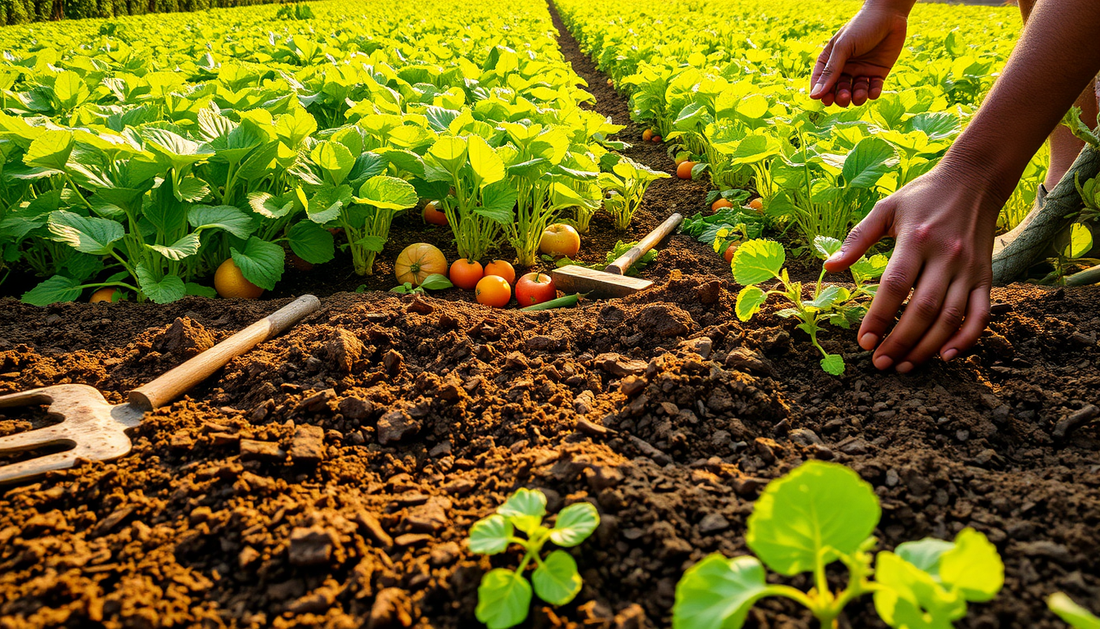
Unlocking the Secret to Bountiful Vegetable Harvests: A Guide to Soil Preparation in Bangalore
Share
Gardening in Bangalore can be a rewarding and fulfilling experience, but it all starts with the foundation - the soil. Whether you're a seasoned green thumb or a budding gardener, understanding how to properly prepare your soil is the key to unlocking a bountiful harvest of fresh, flavorful vegetables.
In this comprehensive guide, we'll dive into the world of soil preparation, exploring the unique challenges of gardening in Bangalore and sharing practical tips to help you create the perfect growing environment for your vegetable plants.
Understanding Bangalore's Soil Landscape
Bangalore's soil is often characterized by its red, lateritic composition, which can present some unique challenges for vegetable gardeners. This soil type is typically acidic, low in organic matter, and can be prone to compaction, making it crucial to amend and improve the soil before planting.
One of the key factors to consider is the soil's pH level. Vegetables thrive best in a slightly acidic to neutral pH range, typically between 6.0 and 7.0. Bangalore's naturally acidic soil may require the addition of lime or other alkaline materials to balance the pH and create the ideal growing conditions.
Preparing the Soil: Step-by-Step
Step 1: Assess Your Soil
The first step in preparing your soil for vegetable gardening is to understand its current composition. You can conduct a simple soil test at home or enlist the help of a local agricultural extension service to determine the soil's pH, nutrient levels, and overall structure.
Step 2: Amend the Soil
Based on the results of your soil test, you can begin the process of amending the soil to create the perfect growing medium for your vegetables. This may involve adding organic matter, such as compost or well-rotted manure, to improve the soil's texture and fertility.
If your soil is particularly acidic, you can incorporate lime or dolomitic limestone to raise the pH. Conversely, if the soil is too alkaline, you can use sulfur or other acidifying agents to lower the pH.
Step 3: Incorporate Organic Matter
Organic matter is the lifeblood of healthy soil, providing essential nutrients, improving soil structure, and promoting the growth of beneficial microorganisms. In Bangalore, where the soil can be depleted of organic matter, it's crucial to regularly add compost, well-rotted manure, or other organic materials to the soil.
One effective method is to create a compost pile or bin, where you can turn household and garden waste into nutrient-rich compost. This not only helps to improve your soil but also reduces the amount of waste going to landfills.
Step 4: Loosen and Aerate the Soil
Compacted soil can be a significant obstacle for vegetable roots, preventing them from accessing the necessary air, water, and nutrients. To address this, use a garden fork or tiller to loosen and aerate the soil, breaking up any hard clumps or layers.
This process also helps to improve drainage, which is essential in Bangalore's monsoon-prone climate. By creating a loose, well-aerated soil structure, you'll provide the ideal environment for your vegetable plants to thrive.
Step 5: Create Raised Beds
Raised garden beds can be a game-changer for vegetable gardening in Bangalore. By elevating the soil, you can improve drainage, prevent waterlogging, and create a more nutrient-rich growing medium. Raised beds also make it easier to manage the soil, as you can focus your amendments and care on a smaller, more manageable area.
When constructing your raised beds, be sure to use high-quality, untreated lumber or other durable materials. The beds should be no more than 4 feet wide, allowing you to easily reach the center from both sides without compacting the soil.
Step 6: Mulch, Mulch, Mulch
Applying a thick layer of organic mulch to the surface of your soil is a crucial step in maintaining optimal growing conditions. Mulch helps to retain moisture, suppress weeds, and gradually release nutrients as it decomposes.
In Bangalore's warm climate, a 2-4 inch layer of mulch, such as shredded leaves, straw, or wood chips, can make a significant difference in the health and productivity of your vegetable garden.
Ongoing Soil Maintenance
Preparing the soil is just the first step in creating a thriving vegetable garden. To ensure long-term success, it's essential to maintain and replenish the soil throughout the growing season.
This includes regularly adding compost or other organic matter, monitoring and adjusting the pH as needed, and rotating your crop plantings to prevent nutrient depletion. By staying vigilant and proactive with your soil care, you'll be rewarded with bountiful harvests of fresh, flavorful vegetables.
Remember, the key to a successful vegetable garden in Bangalore lies in the foundation of your soil. By taking the time to properly prepare and maintain your growing medium, you'll unlock the full potential of your garden and enjoy the fruits (or rather, vegetables) of your labor for years to come.
Happy gardening!
